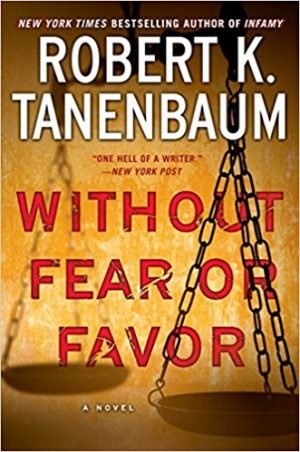
In a rather notorious revelation in 2003, Tanenbaum’s cousin Michael Gruber revealed he had ghostwritten the bestselling author’s novels, the two had parted ways, and he was pursuing his own writing career. With a rather inexpert successor taking over, the quality of Tanenbaum’s books reportedly suffered. Then, for a while, it appeared more expert hands came to the keyboard. I knew none of this when I read Without Fear or Favor, but Tanenbaum’s hunt for a good ghostwriter should continue.
The new novel tells the story of a white cop murdered by a black militant who uses the nom de guerre Nat X. According to Nat X there’s a war on black people, and cops are the enemy. After murdering the policeman early in the story, he entices a teenager to shoot another one, and the remainder of the book is about bringing him to justice.
In some respects, this book is the antithesis of Don Winslow’s The Force, also about black-white relations in New York City as they collide within the criminal justice system. In Winslow’s book, corruption is rampant; in Tanenbaum’s, aside from three vigilante cops, duly punished, the police, the investigators, and the prosecutors are models of probity. Their solid ideals are revealed in unrealistic, lengthy statements, more like essays than realistic conversations.
If these editorial opinions were confined to one or two characters, you could accept that they reflect a particular character’s point of view, but the same manner of exposition continues in the narration, which becomes indistinguishable from the characters’ good citizenship and flaws in the system lectures.
Targets of the narrator’s ire are the news media, black activists, of course, and white liberals. Even the education system comes in for abuse, with public schools described as dangerous places where successful learning is impossible – “…such was the nature and cruelty of low expectations.”
In addition to constant editorialising, the writer has a bad habit of introducing a bolus of backstory every time a new character is introduced, but it is backstory of the most superficial kind. It doesn’t explore the individual at all, and you’re left to apply whatever assumptions you may have about someone described, for instance, as a product of “…only the finest prep schools.”
Unsurprisingly, the story is loaded with clichés and stereotyped and cardboard characters. Still, there are some truly odd features, one of which is District Attorney Karp’s receptionist’s name, Darla Milquetoast. Since a fictional character has a name of the author’s choosing, why choose such a strange one? According to the 2010 Census, there is not one person in the United States with that last name. But, ok, if that’s the name, why continue to give it in full every time the character appears? It’s obvious the name is intended as some kind of clever joke. Likewise, both the murdered policeman, Tony Cippio, and Nat X AKA Anthony Johnson, Jr have the same first name – that surely isn’t accidental, but what does it mean?
Perhaps most puzzling are the courtroom scenes of Nat X’s trial. I wonder whether Tanenbaum even read them. The defense attorney is not a worthy adversary for Karp, which greatly undercuts the tension of the trial. Moreover, her deceptive behaviour is at odds with ethical legal practice.
If you like legal thrillers, you may find more believable courtroom drama in Steve Cavanagh’s The Liar or The Plea, or Say Nothing by Brad Parks.
Gallery Books
Print/Kindle/iTunes
£ 7.66
CFL Rating: 2 Stars